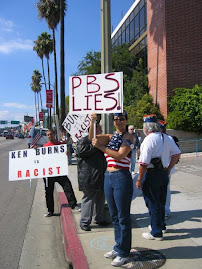
There are people of Mexican origins who speak of Chicanas and Chicanos as though they have gone the way of dinosaurs—no longer around, if not extinct. For others, the image of Chicanas and Chicanos is frozen in the time of 1960s street protestors with raised fists. But as Chicanas and Chicanos still take to the streets when necessary, they have also infiltrated board rooms (political and, some, corporate I imagine), the faculty and administrations of academe, and other institutions. As I write, I am reminded of the ending of Luis Valdez’s Los Vendidos (The Sellouts) play in which Mexican characters representing stereotypes map out the infiltration of Chicanos throughout the nation, even Rumford, Maine.
The label of Chicana/Chicano is well alive. Last night I enjoyed George Lopez’s Tall Dark & Chicano show. Lopez stood before yet another sold out show at the 7,000 seat Nokia Theatre L.A. Live. It was very funny as well as affirming of the syncretic culture that is Chicana/o. Similar to previous tours, Lopez’s comedic stories contrasted his late baby boom upbringing in the San Fernando Valley with that of today’s adolescents. Toward the end of the show, Lopez repeatedly implored audience members in their mid-twenties and thirties to savor their youth. His admonition reminded me of George Bernard Shaw’s adage, “Youth is wasted on the young.” (I thought it was Mark Twain but a quick Google tells me otherwise).
Unlike his 2005 show at the Universal Gibson Amphitheatre, Lopez was also more political in that he took jabs at the outgoing W and the Terminator. He also condemned the creation of a wall along the US-Mexico border. He compared the creation of a nativist inspired wall like putting on a condom after having sex since some 45 million Latinos already live in the US. He also characterized the social-political present as “our time.” Lopez meant that a cultural-demographic shift was presently taking place. As I listened, I thought of a host of issues that our society needs to address in this regard, mainly having to do with education.
fpb
The label of Chicana/Chicano is well alive. Last night I enjoyed George Lopez’s Tall Dark & Chicano show. Lopez stood before yet another sold out show at the 7,000 seat Nokia Theatre L.A. Live. It was very funny as well as affirming of the syncretic culture that is Chicana/o. Similar to previous tours, Lopez’s comedic stories contrasted his late baby boom upbringing in the San Fernando Valley with that of today’s adolescents. Toward the end of the show, Lopez repeatedly implored audience members in their mid-twenties and thirties to savor their youth. His admonition reminded me of George Bernard Shaw’s adage, “Youth is wasted on the young.” (I thought it was Mark Twain but a quick Google tells me otherwise).
Unlike his 2005 show at the Universal Gibson Amphitheatre, Lopez was also more political in that he took jabs at the outgoing W and the Terminator. He also condemned the creation of a wall along the US-Mexico border. He compared the creation of a nativist inspired wall like putting on a condom after having sex since some 45 million Latinos already live in the US. He also characterized the social-political present as “our time.” Lopez meant that a cultural-demographic shift was presently taking place. As I listened, I thought of a host of issues that our society needs to address in this regard, mainly having to do with education.
fpb

